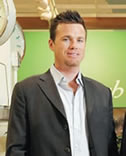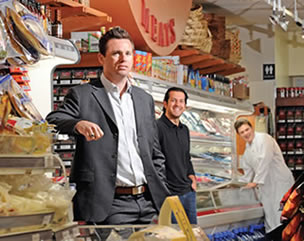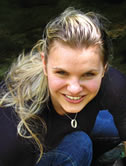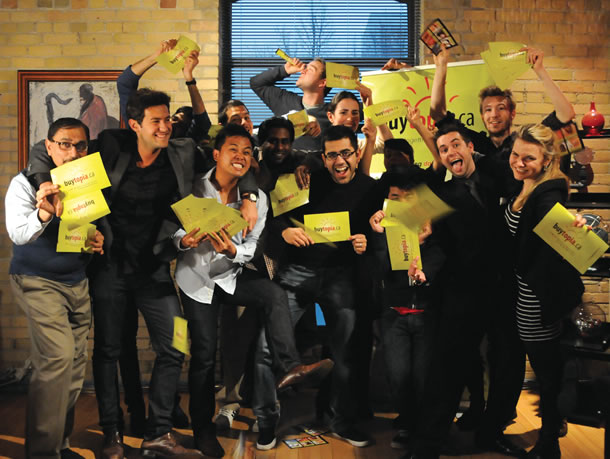Group-Buying Power

On any given day, there are online deals to be scooped. One random day in mid-November, the deals included a car detailing and a mechanical inspection for $39 (regularly $159) from Deal of the Day; $50 worth of pork chops for $25 from WagJag; and Executive Limo service to Toronto’s Pearson Airport from Buytopia for $39 instead of the typical $99. Besides offering significant savings to internet savvy Canadian shoppers, these industry-leading sites all have a QSB connection: Derek Szeto, BCom’05, founded Deal of the Day as an offshoot of his highly successful RedFlagDeals.com website; Tim Ray, AMBA’11, launched Foodscrooge, a grocery group-buying site acquired by TorStar’s WagJag in September; and Michele Romanow, MBA’08, is the co-founder of Buytopia, a site that offers discounted services with a charitable twist.
Shoppers have been flocking to online group-buying sites in recent years. Six of ten Canadians have tried them, according to QSB Professor John Pliniussen, who specializes in sales, e-marketing and innovation. He not only studies their offerings, he buys them. “I just purchased three acupuncture visits through a group-buying online site from a local business I didn’t know existed—at a third of the price I’d been accustomed to paying,” he enthuses. “Nice!”
Shopping and buying via the Internet have never been more popular, John says. “Group-buying is just the latest iteration of e-tailing and social networking. And it’s big in Canada, which has more group-buying sites per capita than the US [100+ at last count, according to GroupbuyingCanada.com]. However, with increased competition and consumers becoming more aware of their choices, the challenge will be to figure out how to evolve and make this segment sustainable for all stakeholders (e.g. consumers, merchants, producers).”
Derek, Tim and Michele are well aware of this and the other challenges that come with launching a new venture. Despite their relative youth, all three are seasoned entrepreneurs, having launched at least one other business venture in addition to their current ones. They all credit their Queen’s experience as having provided fuel to feed their entrepreneurial spark.
Red Flag Deals
 Derek Szeto At 29, Derek Szeto is a veteran in the online retail sector with 11 years’ experience and a YouTube video to prove it (“Eleven Years in 3 Minutes”). “I did a lot of my shopping online, trying to save money,” he recalls. “I was a high school student in Oakville, and there wasn’t a lot of money to go around. I thought I could share the deals I found with others and learn a bit about the Internet in the process. It really wasn’t meant to be any kind of business.”
Derek Szeto At 29, Derek Szeto is a veteran in the online retail sector with 11 years’ experience and a YouTube video to prove it (“Eleven Years in 3 Minutes”). “I did a lot of my shopping online, trying to save money,” he recalls. “I was a high school student in Oakville, and there wasn’t a lot of money to go around. I thought I could share the deals I found with others and learn a bit about the Internet in the process. It really wasn’t meant to be any kind of business.”
It turned out to be just that, though—a business he would run on a part-time basis while completing his Queen’s Commerce degree, and one he would pursue full-time after graduating. RedFlagDeals.com began in Derek’s basement in 2000 when he launched a rudimentary website about online shopping deals in his area. A degree in business was a logical next step. “I knew I wanted to go into business, whether as an entrepreneur or not,” he says. He’d seen first-hand what running a business entails by watching and helping out his parents at their Chinese fast food restaurant in Hamilton.
As a Commerce student, Derek pursued a generalist path. He flirted with going the accounting route, even spending a summer with Ernst & Young, which he remembers as a “great experience.” It wasn’t until he had to decide on whether he’d pursue a specialty that his career aspirations became clear. “I thought back to my summer job at E&Y and compared it to my part-time job running RedFlagDeals and realized that I was having more fun, was more interested and more engaged in doing something for myself. Any time you can combine what you’re passionate about—in my case it was shopping and saving money—with what you do for a living, well, that’s the path to take.”
 By foregoing a specialty, Derek was free to pursue a broad variety of courses that interested him. “I took Managerial Tax with Prof. Dan Thornton and thought that was an amazing course. I was able to apply what I learned there to my business. I also really appreciated the breadth of content the Commerce program offered and the opportunity to learn from my classmates and professors, who were exceptional.”
By foregoing a specialty, Derek was free to pursue a broad variety of courses that interested him. “I took Managerial Tax with Prof. Dan Thornton and thought that was an amazing course. I was able to apply what I learned there to my business. I also really appreciated the breadth of content the Commerce program offered and the opportunity to learn from my classmates and professors, who were exceptional.”
One such professor was Marketing Hall of Legends inductee Ken Wong, who acted as a mentor and served on RedFlagDeals’ Advisory Board in the early years. “I could pitch ideas to Ken and get his feedback. If we needed introductions, he would help. He and some of the other professors were always happy to give their time to lend a hand,” Derek recalls appreciatively.
Armed with his BCom, Derek took the plunge in 2005, leased a 400-sq.-ft. office in Toronto and hired his first employee. He also wed his Commerce classmate Sharon Lee, who has been with KPMG in Toronto since graduation. RedFlagDeals.com was in the right place at the right time to succeed, Derek reflects. “We were ahead of our time and we really focused on the Canadian consumer. There were very few deals and online shopping sites targeted at Canadians. There were a lot of sites in the US providing shopping information for US consumers, so we adopted their model and brought it to a Canadian audience that was underserved.”
The site grew and prospered by charging retailers a fee for sending online shoppers to view their specials. More staff were hired and a larger office space was acquired in 2006 when Derek was profiled in Inquiry magazine, this publication’s predecessor. By 2009, RedFlagDeals had two million unique visitors each month. It also attracted the attention of potential site buyers. “We had been profitable for a very long time and had no need to be acquired,” Derek explains, “but when YellowPages called in 2009, it was a different story.” Yellow-Pages offered the chance to provide more local content, to tie deals to specific stores in the consumer’s city, and to map their locations. It also offered an opportunity to break into the French language market in Quebec, something Derek had been interested in for some time.
The deal was finalized in February 2009, with Derek becoming General Manager of Deals, Coupons and Shopping within the YellowPages group. He and his team of 30 continue to manage RedFlagDeals.com, as well as a later offering, Deal of the Day / Promo du jour that launched in September 2010. Like other group-buying sites, Deal of the Day offers time-limited bargains on a wide variety of goods and services.
 Derek Szeto (second from right) and his team Working for a conglomerate versus owning one’s own business has its challenges, Derek concedes. “At a large company, decision-making is more time consuming,” he admits. “You have to make sure everyone is on board and in sync. The advantage is, you can leverage a lot more resources. We had an insert in the YellowPages directory in Toronto, for example, with a circulation of several hundred thousand, and there’s an ad on YellowPages.ca promoting our offers. That site’s not even open to external advertisers, so that gives us a big edge.”
Derek Szeto (second from right) and his team Working for a conglomerate versus owning one’s own business has its challenges, Derek concedes. “At a large company, decision-making is more time consuming,” he admits. “You have to make sure everyone is on board and in sync. The advantage is, you can leverage a lot more resources. We had an insert in the YellowPages directory in Toronto, for example, with a circulation of several hundred thousand, and there’s an ad on YellowPages.ca promoting our offers. That site’s not even open to external advertisers, so that gives us a big edge.”
Much has changed since Derek launched that basic website from his parents’ basement, but one thing has not: He still loves to shop and he still loves getting deals. “We just had our first child, Matthew, in May. Of course I found a lot of deals for baby things on RedFlagDeals.com,” he laughs.
WagJag Grocery
 Tim Ray When Tim Ray was 21, he had a list of things he wanted to accomplish before he turned 30. With that milestone approaching in September 2010, he was well on his way to crossing off two items: “Get an MBA” and “Become a full-time entrepreneur.” He instinctively knew when compiling his list that completing the one could lead directly to accomplishing the second.
Tim Ray When Tim Ray was 21, he had a list of things he wanted to accomplish before he turned 30. With that milestone approaching in September 2010, he was well on his way to crossing off two items: “Get an MBA” and “Become a full-time entrepreneur.” He instinctively knew when compiling his list that completing the one could lead directly to accomplishing the second.
The idea for Foodscrooge, an online grocery group-buying website, came to Tim when he was nearing the end of his Queen’s Accelerated MBA (AMBA) for Business Graduates program in late November 2010. “I was listening to a team present its consulting project for a company in the group-buying space,” he recalls. “At that time, I had no idea what group-buying was. As soon as I heard their presentation, it was like putting two and two together. I thought, ‘I could do a group-buying site for food.’”
It wasn’t even that much of a leap. Tim had spent five years at Maple Leaf Foods managing all the company’s commodity poultry sales for Western Canada. Even though the AMBA program is designed for those who continue to work while pursuing their degree, Tim decided to leave Maple Leaf to devote his full energies and attention to his studies. “I was a classic example of a concept that (Strategy Professor) Elspeth Murray covers in her classes: successful entrepreneurs who often get real-world experience in a particular industry and then look for opportunities to innovate within that space.”
By the time the consulting projects class wrapped up, Tim had already chosen a name for his new venture, Foodscrooge. “I registered the name and incorporated it the week after that class. Within weeks, I was preparing the business case and going full steam. By January, after classes had ended in December, the business would become my full-time job.”
The concept was a simple one: Source deals directly from the manufacturer in bulk-packaged formats and make them available to subscribers for pick-up from a local retailer. Tim’s extensive contacts in the meat industry would open doors to suppliers who recognized the opportunity to reach a new market.
It became apparent that he had come up with a winning idea when he entered and won a business case competition organized by QSB’s Monieson Centre in partnership with the Prince Edward/Lennox & Addington Community Futures Development Corporation (PELA/CFDC). Tim’s was one of three enterprises pitched by Queen’s students that received a $150K loan funded by the federal government to launch startups in the region. (See the full story in QSB Magazine, Summer 2011, page 8.)
The loan, combined with his own capital, was enough to set up shop in the Picton Innovation Centre run by Conrad Guziewicz, one of the competition judges who became a mentor. He also brought in his business partner, Jonathan Ambeault. Tim and Jonathan had launched their first venture, EcoSpark Technologies, in 2008, a venture they pursued in addition to holding down full-time jobs. The company focuses on facilitating the adoption of electric vehicles through the placement and installation of charging stations in convenient locations at affordable cost.
 Tim Ray, left, checks out the wares at Vince’s Market in Toronto. Local retailers are key partners in WagJag Grocery’s success.“Jonathan is a very detail-oriented, process-driven kind of guy,” Tim explains. “I’m more the visionary, ideas, sales kind of guy. We complement each other really well, kind of like Ying and Yang. One of the important lessons I learned as an entrepreneur is that it’s really important to surround yourself with people who have the skills you don’t have.”
Tim Ray, left, checks out the wares at Vince’s Market in Toronto. Local retailers are key partners in WagJag Grocery’s success.“Jonathan is a very detail-oriented, process-driven kind of guy,” Tim explains. “I’m more the visionary, ideas, sales kind of guy. We complement each other really well, kind of like Ying and Yang. One of the important lessons I learned as an entrepreneur is that it’s really important to surround yourself with people who have the skills you don’t have.”
Tim found that having a Queen’s MBA was an added tool in his arsenal when meeting potential suppliers, investors and other professional contacts. “The Queen’s name is highly respected,” he says. “When you’re an entrepreneur and you’re trying to break into business, having an MBA is a definite plus. Then when people found out I had an MBA from Queen’s, it added a second point of reference that helped give more weight to what I had to say.” His credibility was definitely on the line when he went into the Dragons’ Den, the hit CBC-TV show that gives budding entrepreneurs the chance to pitch their ventures to potential investors. Tim’s appearance was taped in April and aired in December (watch Episode 10, Dec. 7, 2011). “We ended up doing deals with Arlene Dickinson and Bruce Croxon and both provided invaluable advice and mentoring.”
Foodscrooge was ready to launch in April with a test run in the Greater Toronto Area. So successful was that foray that the site attracted the attention of two potential buyers. One was WagJag, a TorStar company that is the largest online group-buying site in Canada. A July meeting pretty much sealed the WagJag-Foodscrooge deal. “TorStar is such a strong brand, with a lot of companies under its banner—industry leaders like Metroland, Save.ca and Flyerland already in the grocery space. We wanted to go national, and TorStar has the resources to make that happen,” Tim explains. “They were immediately interested in acquiring Foodscrooge because they wanted to add a grocery component to their already successful WagJag site.” Over the summer the deal took shape and was finalized September 23. The timing might have been better. Tim and his fiancée Julia Jordan were married on Sept. 17. “This past year has been a bit of a roller coaster, but it was a good ride,” he laughs.
As General Manager of WagJag Grocery, Tim is frequently on the road, working on expanding into other markets. Vancouver and Ottawa are up next, with more to follow. As Derek Szeto also found, there are pros and cons to working in a corporate versus an entrepreneurial environment. “While there are processes to follow and some red tape involved, we can draw on WagJag’s 100 staff to help us scale up the business quickly,” Tim explains. “I really enjoyed the daily challenge of trying to grow something from nothing. There’s an excitement and adrenalin rush in trying to succeed in making a go of a new concept. But there were also things I didn’t enjoy—putting in 16-hour days because I was the Finance, Customer Service, Sales and Operations departments, for example. Now WagJag’s customer service staff answer those types of emails and I’m freed up to focus more on strategic and growth aspects of the business. And yes, my quality of life has greatly improved.”
Buytopia.ca
 Michele Romanow Michele Romanow, youngest of the trio at 26, is on her third new venture and enjoying the ride. The Calgary native’s latest enterprise is Buytopia.ca, an online group-buying site that offers consumers the chance to discover and explore their city by trying new experiences such as a new restaurant or spa or taking scuba diving lessons at a fraction of their usual price. Buytopia also offers charities the opportunity to introduce their members and stakeholders to these online offerings and take a percentage of the value of purchases generated through their referrals.
Michele Romanow Michele Romanow, youngest of the trio at 26, is on her third new venture and enjoying the ride. The Calgary native’s latest enterprise is Buytopia.ca, an online group-buying site that offers consumers the chance to discover and explore their city by trying new experiences such as a new restaurant or spa or taking scuba diving lessons at a fraction of their usual price. Buytopia also offers charities the opportunity to introduce their members and stakeholders to these online offerings and take a percentage of the value of purchases generated through their referrals.
Her entrepreneurial bent and social conscience were revealed during her engineering student days at Queen’s. Along with several classmates, she founded The Tea Room in 2005, the place for exotic teas and cappuccinos on campus that pioneered new environmentally friendly technologies and practices. Her role as a co-founder and her impressive contributions to Queen’s garnered Michele the 2007 Tricolour Award, the highest tribute given to Queen’s students by their peers for service to the University in extracurricular, non-athletic activities.
Michele continued to keep an eye on The Tea Room’s progress during her MBA studies, an intense 12-month experience that whetted her entrepreneurial appetite even more. She teamed up with fellow Engineering grads Anatoliy Melnichuk, BSc’07, Arts’08, and Ryan Marien, BSc’08, Arts’08, to compete in several business case competitions pitching Evandale Caviar, a sustainable sturgeon aquaculture facility. They captured five first-place prizes totalling more than $100,000 in competitions across North America, including Michele’s Dare to Dream Internship from QSB that contributed $15,000 towards the total.
“After my MBA graduation, I turned down a couple of job offers in order to launch the caviar business with my engineering classmates,” Michele recalls. “We chose New Brunswick, where we lived for three months to establish the fishery, then went on the road, visiting high-end restaurants to sell our product.”
They grew a profitable business before two disasters struck, the 2008 recession that drastically affected luxury purchasing and new federal legislation that effectively put an end to their ability to export their product. Without access to the lucrative US and Asian markets, the business faltered. The partners went on to other endeavours with Michele landing a position at Sears Canada as Director of Corporate Strategy and Business Improvement in Toronto.
“I switched gears and went into a corporate role,” she says. “I had a wonderful time there developing growth strategies for the company, looking at how to take a department store, one of the oldest models in retail, and update it.”
While investigating retail promotions opportunities at Sears, Michele was introduced to the group-buying concept. When Ryan returned from his studies in the UK and settled in Toronto, the three business partners reunited to explore another new venture opportunity. “When we were starting the caviar business, we must have revised our business plan 100 times,” Michele laughs. “This time, we decided to put together a group-buying website and see how it fared. Our first deal (a Toronto spa promotion launched in December 2010) made $10,000, so we figured this was a business worth pursuing.” Michele left Sears to focus on the new start-up full-time and Buytopia has been thriving ever since, with revenues doubling each month over the last six months and counting.
“We’ve had multiple offers for funding and investment, but we’ve chosen to stay independent,” Michele explains. They’ve also grown from a start-up comprised of the three founders to an operation with 20 staff and an office in Toronto’s trendy King Street West district. The site now serves consumers in Canada’s five major metropolitan areas: Vancouver, Edmonton, Calgary, Toronto and Montreal. They’ve done deals with thousands of local merchants and have also partnered with national brands such as Staples, Sears and Cirque du Soleil.
Repeat customers are a key ingredient in Buytopia’s success, Michele says. “If people try a new restaurant using a Buytopia voucher and if they’re treated really well and enjoy the experience, they’ll be back, and they’ll tell their friends. They’ll also come back to Buytopia to see what other great deals we have to offer. To encourage sharing and repeat visits we give our consumers Buytopia credits every time one of their friends buy. And the merchants come back because they’ve seen the results.”
Like Tim and Derek, she acknowledges that there’s a significant time commitment in starting a new venture. “I don’t think there are many Saturdays or Sundays when I’m not here in the office, but that’s just part of the territory when you’re a growing enterprise. And I love the excitement of growing it, going from three to 20 employees. Seeing that growth and the opportunities that come from it is really exciting.”
Another bonus is helping local businesses prosper. “I really like the business we’re in,” she says. “It’s great to offer incredible deals to consumers, to give charities a chance to fundraise, and to help new and established local businesses in their communities. Everybody wins.”
 Michele Romanow (far right) and the Buytopia team celebrate making deals come true.
Michele Romanow (far right) and the Buytopia team celebrate making deals come true.
It’s hardly surprising that QSB is turning out highly successful entrepreneurs according to Elspeth Murray, Associate Dean, MBA programs and the CIBC Faculty Fellow in Entrepreneurship. “We firmly believe that no MBA should graduate without having walked a mile in an entrepreneur’s shoes,” she says. “Our whole premise is that we want to improve the odds of success of new ventures. We don’t try to make entrepreneurs. We take born entrepreneurs and make them better.” For those not so inclined, it’s nevertheless important that they understand entrepreneurship concepts. “They’ll cross paths with entrepreneurs in business, whether in accounting firms or the finance sector, as clients, suppliers or partners,” she elaborates. “In many large organizations there’s an emphasis on innovation and ‘intrapreneurship’ whereby employees are expected to pitch new businesses, products or services within the larger organization. The entrepreneurship knowledge our students gain at QSB is invaluable in helping them excel at doing so.”
All of the School’s MBA programs include required courses in entrepreneurship or the completion of either a New Venture or a Consulting project. Undergraduate students are exposed to entrepreneurship elective courses and gain hands-on experience through business plan competitions and the Tricolour Venture Fund—Canada’s first student-advised venture capital fund that allows Commerce and full-time MBA students to manage a multi-million dollar fund. In addition to the Dare to Dream Internship and the PELA/CFDC Business Plan Competition mentioned earlier, undergraduate students can compete in the Kinnear Business Plan Competition, funded by brothers Paul (BCom’63) and Tom (BCom’66) Kinnear. The $5,000 top prize is awarded to the student with the best business plan for a newly operating or soon-to-launch venture.
Strategy and Organization Professor Kelley Packalen teaches the Commerce entrepreneurship courses and oversees the Kinnear Business Plan Competition. She’s impressed at the high quality presentations she sees from students competing for the top prize. “Last year, all the finalists were already in business and all were already generating revenue,” she says. “It was a similar scenario in the PELA competition. These weren’t theoretical concepts, the teams had all made significant progress in terms of developing their key products or services.”
A common trait among successful entrepreneurs that’s shared by Derek, Tim and Michele is summed up by Kelley. “People perceive entrepreneurs as being risk takers when in fact they tend to be calculated risk takers. They’ve done their homework. They get a sense of the odds of success and they understand these. They go into business optimistically, but knowing full well the risks and how they’re going to overcome them.”
Derek, Michele and Tim know the risks—they’ve experienced their fair share so far. All three are confident the group-buying phenomenon is here to stay, but this is the internet after all. Version 3.0 anyone?
Check out another QSB entrepreneurial alum:
Alyssa Richard, BCom’07, launched Ratehub.ca, a search engine for Canada’s best mortgage rates. View her first-person account on being a successful entrepreneur at qsb.ca/magazine/ratehub
